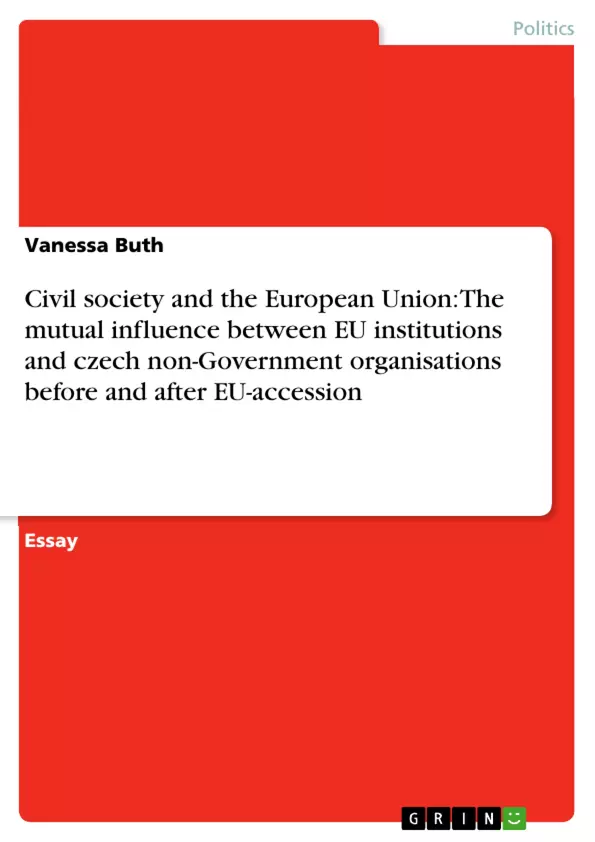Since the fall of communism CEE countries are undergoing a revival of civil society, also referred to as the ‘third sector’, which emerged after restrictions imposed under the communist party were abolished. The concept of civil society in its broader sense is the part of a society that exists next to state and market, the London school of Economics Civil Society department refers to it as “the arena of uncoerced collective action around shared interests, purposes and values.” This collective action is formed by voluntary civic and social organisations or institutions referred to as non-profit organisations (NPOs) and non-governmental organisations (NGOs). This phenomenon is of high interest considering the current European wide dispute over the role civil society should have next to government and business. European institutions have been trying to enhance the development of NGOs in Central and Eastern European (CEE) countries through financial as well as institutional help. The EU enlargement was assumed to even further encourage the development of NGOs in CEE countries. Thus, the Czech Republic, one of the first aspirants of the CEE countries entering the EU, is considered to be a prime example to show how the mutual relation between the non-governmental sector in CEE countries and the EU institutions developed. To be able to define the politics and policies for future assistance of the European Union to CEE NGOs, two aspects are of special importance. One, it is necessary to understand the success NGOs in CEE countries have had in terms of succeeding to promote their interests in EU decision-making before and after the accession. Second, it is crucial to determine the role the European Union has played in the achievement of their goals.
Inhaltsverzeichnis (Table of Contents)
- 1 Introduction
- 2 NGOs in the Czech Republic
- 2.1 Why do non-government organisations matter?
- 2.2 Challenges of the non-government sector
- 3 EU institutions support for NGOs in Czech Republic before and after EU accession
- 3.1 Pre-accession period
- 3.1.1 Pre-accession Funds
- 3.1.2 The EU Agenda assisting NGO projects
- 3.1.3 Failures of the pre-accession means
- 3.2 Post-accession period
- 3.2.1 Post-accession Funding
- 3.2.2 Problems with EU funding and the transition to new funding sources
- 3.2.3 Agenda
- 3.2.4 Agenda Problems
- 4 Influence of Czech NGOs on EU institutions before and after EU accession
- 4.1 Pre-accession
- 4.2 Post-accession
- 4.2.1 Agenda setting
- 4.2.2 Lobbying and advocacy organisation on the national level
- 4.2.3 Problems of Czech NGOs on the EU level
Zielsetzung und Themenschwerpunkte (Objectives and Key Themes)
This essay examines the mutual influence between Czech NGOs and EU institutions before and after the Czech Republic's accession to the EU. The focus is on environmental, development, and human rights NGOs, considering the role of European measures in this relationship. The essay aims to understand the success of Czech NGOs in promoting their interests in EU decision-making and the role the European Union has played in the achievement of these goals.
- The development of civil society in the Czech Republic following the fall of communism
- The role and challenges of NGOs in the Czech Republic, particularly their influence on policy
- The support provided by EU institutions to NGOs in the Czech Republic, both before and after accession
- The efforts of Czech NGOs to influence EU policy-making, including lobbying and advocacy
- The impact of EU enlargement on the development of the relationship between Czech NGOs and EU institutions
Zusammenfassung der Kapitel (Chapter Summaries)
- Chapter 1: Introduction
- Chapter 2: NGOs in the Czech Republic
- Chapter 3: EU institutions support for NGOs in Czech Republic before and after EU accession
- Chapter 4: Influence of Czech NGOs on EU institutions before and after EU accession
This chapter provides an introduction to the concept of civil society and its role in the Czech Republic, highlighting the emergence and growth of the non-governmental sector after the end of communism.
This chapter explores the importance of NGOs in Czech society, examining their varied activities, challenges, and the differing opinions on their role, particularly the contrasting perspectives of Václav Klaus and Václav Havel.
This chapter analyzes the support provided by EU institutions to Czech NGOs during the pre-accession and post-accession periods, including pre-accession funds, EU agendas, and funding challenges.
This chapter investigates the efforts of Czech NGOs to influence EU policy-making, examining their pre-accession and post-accession strategies, including agenda setting, lobbying, and advocacy.
Schlüsselwörter (Keywords)
The main keywords and focus topics of the text include: civil society, NGOs, non-governmental organizations, EU institutions, Czech Republic, EU accession, pre-accession, post-accession, EU funding, lobbying, advocacy, policy influence, development, human rights, environment.
Frequently Asked Questions
How has civil society in the Czech Republic evolved since 1989?
Following the fall of communism, there was a revival of the 'third sector,' with the emergence of numerous NGOs focused on environmental, human rights, and development issues.
What role did the EU play in supporting Czech NGOs before accession?
The EU provided financial assistance through pre-accession funds and institutional help to encourage the development of a vibrant non-governmental sector in Central and Eastern Europe.
How do Czech NGOs influence EU decision-making?
Czech NGOs engage in lobbying and advocacy, both at the national and EU levels, to promote their interests in environmental protection and human rights within the EU framework.
What were the challenges regarding EU funding for NGOs?
Many NGOs faced difficulties with the transition from pre-accession grants to more complex post-accession funding structures, often leading to administrative and financial hurdles.
What is the difference between Václav Klaus's and Václav Havel's views on NGOs?
Havel championed a strong, independent civil society as essential for democracy, while Klaus was more skeptical, viewing NGOs as potentially bypassing traditional democratic processes.
- Citar trabajo
- Diplom-Kauffrau, MA Contemporary European Studies Vanessa Buth (Autor), 2006, Civil society and the European Union: The mutual influence between EU institutions and czech non-Government organisations before and after EU-accession , Múnich, GRIN Verlag, https://www.grin.com/document/65493



